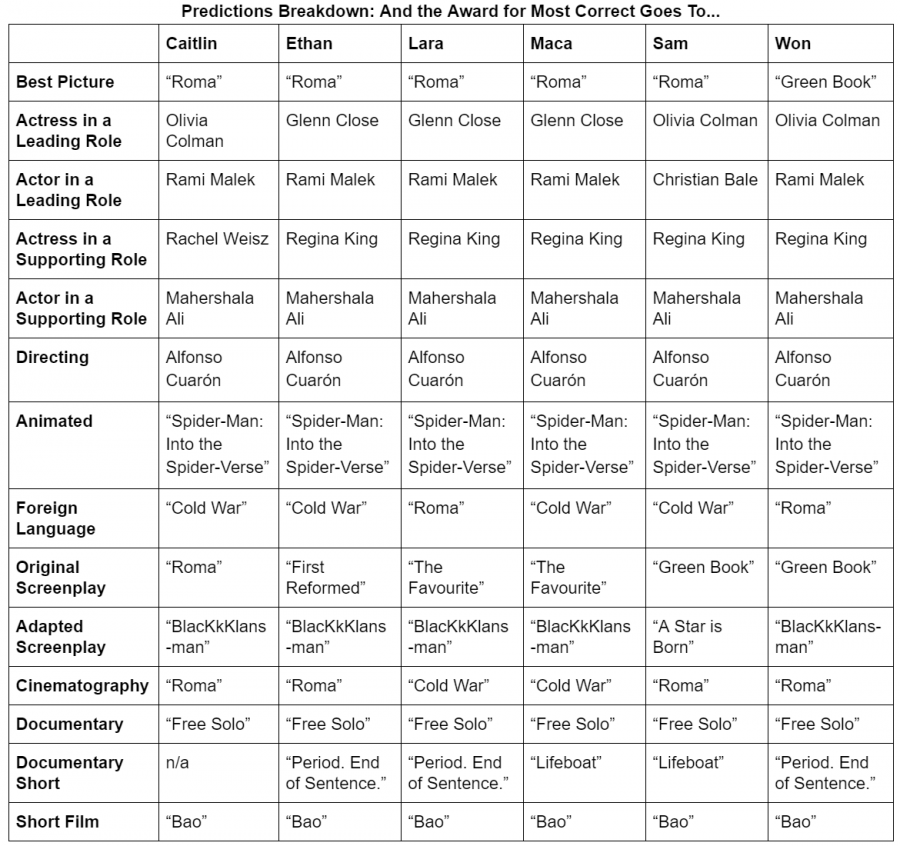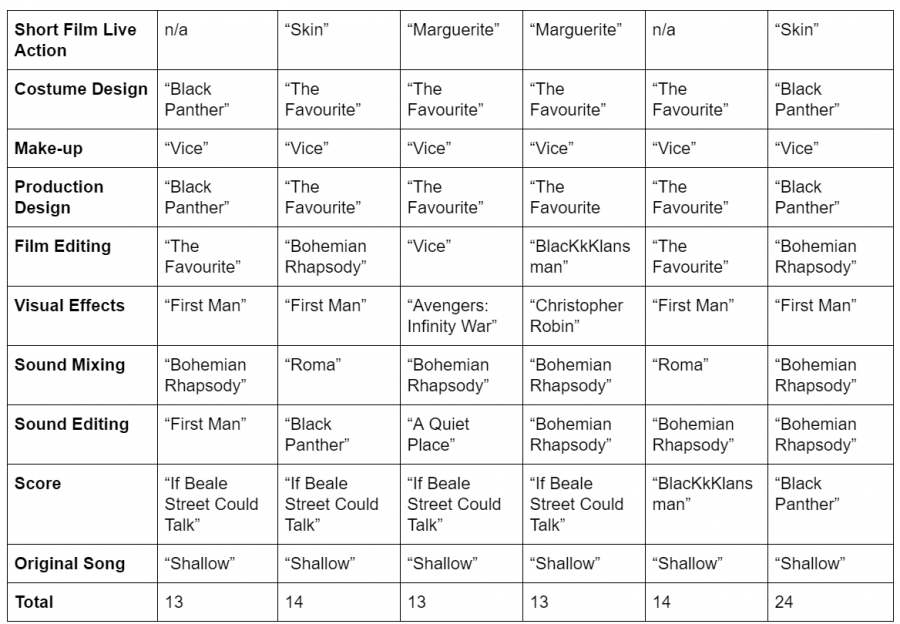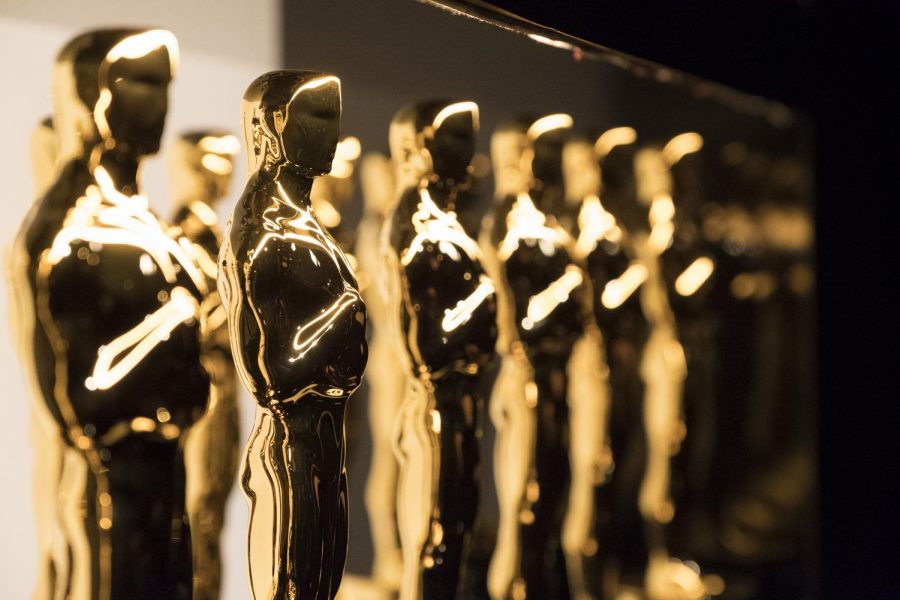Battle of the Oscars
February 27, 2019
This year, the Academy tried something new and had the voters blindfold themselves before they put in their votes for Best Picture. While that is obviously not true, it is the only conceivable explanation for why a film like “Green Book” could beat films such as “Roma” or “The Favourite.” Caitlin Bury, Ethan Coughlin, Lara Foley, Maca Leon and Samantha Vogel put their film prowess to the test, submitted their predictions for each category and provided their thoughts on the outcomes. In the end, Coughlin and Vogel came out on top, correctly predicting 14 of the 24 awards.
Ethan
Legendary director Alfred Hitchcock famously said, “To make a great film you need three things — the script, the script and the script.” This year’s Oscars saw great nominees in both the Original and Adapted Screenplay categories, with no clear front runner in either race. For Best Adapted Screenplay, the Academy fulfilled my hopes by choosing “BlacKkKlansman” by Charlie Wachtel, David Rabinowitz, Kevin Willmott and Spike Lee. The screenplay was able to effectively tell a true story about a serious subject while recognizing its humor and absurdity. Despite taking place in the 70s, the writers made sure the audience understood its relevance today.
When it came to Best Original Screenplay, the Academy and I were not on the same page. The screenplay for “Green Book,” written by Nick Vallelonga, Brian Currie and Peter Farrelly, was flat-out mediocre. The fact that three straight white men wrote a screenplay about a homosexual black man should have been a red flag from the start. The film is out of touch with its subject matter, and the dialogue for both leads could not have been more stereotypical. I thought “First Reformed” by Paul Schrader was a shoo-in for this award. Schrader has written the screenplays for iconic films like “Taxi Driver” and “Raging Bull,” yet this was his first-ever nomination. On top of “First Reformed” being a fantastic film, I thought this may be the old “we owe you” award. Ultimately, the work of Paul Schrader will be remembered far longer than the work of Nick Vallelonga will — so who really won?
Lara
Having predicted Regina King and Mahershala Ali to win Best Supporting Actress and Best Supporting Actor, respectively, I was delighted by their wins. They were more obvious wins than those which followed, in terms of the performance categories. It seemed to be a battle between Christian Bale and Rami Malek for Best Actor; the latter won for his portrayal of Freddie Mercury in “Bohemian Rhapsody.” I had predicted Glenn Close to win Best Actress, as she had won several awards in previous ceremonies for her work in “The Wife;” thus, the win for Olivia Colman came as a surprise. Colman’s win was a joyful moment not only for “The Favourite’s” cast and crew — whose 10 nominations only led to one win — but also for the audience, as she treated us to the night’s most endearing speech. I felt two people were missing from the performance categories: Joanna Kulig (“Cold War”) and Carey Mulligan (“Wildlife”) as leading actresses. The two stood out as beautifully strong and emotionally driven characters in similarly picturesque and quiet yet intense films.
Samantha
Without John Williams, “Star Wars” would be nothing. In fact, before the first “Star Wars” movie was given its iconic original score, the movie — already deemed a risk to the industry — was seen as meandering and meaningless. Today, “Star Wars” is one of the highest grossing franchises of all time, and a huge part of its success lies in its score. In other words, a movie score can make or break a film.
The music, like every other component of a film, furthers the movie’s storyline, point or purpose. This year’s nominees for Best Original Score were “BlacKkKlansman,” “If Beale Street Could Talk,” “Black Panther,” “Isle of Dogs” and “Mary Poppins Returns.” While I did not see “Mary Poppins Returns,” I saw the rest. A score should stick with you as a defining element in the film — especially if nominated for an Academy Award. While I liked all the films for different reasons, I felt “If Beale Street Could Talk” had the standout original score.
After seeing “Beale Street,” I left with two major impressions: the cinematography and the score. I cannot separate the movie from its score; there is no thinking of one without the other. Though I appreciated the score for “Black Panther,” it did not stay with me after I left the theater. It aided the storyline and provided tension, detailed emotions and actions; however, it held no candle to “Beale Street.”
The score for “Beale Street” did not merely aid in telling the story or heightening climatic moments. It was almost as if the movie followed the score. It made you feel love, pain, passion, everything and nothing, with the characters and within yourself. The sounds were charming, haunting and beautiful all at once, and they stayed with me weeks afterwards. Perhaps the Academy forgot how to truly listen to an original score and appreciate it as a work of art.
Caitlin
There’s a kind of romance to the words 4:3 aspect ratio and black-and-white. This may be a strange notion of romance, but to a cinephile that watched and devoured the cinematographic excellence displayed in Pawel Pawlikowski’s “Cold War,” it is not strange at all. Although Alfonso Cuaron won the Oscar for Best Cinematography for his film “Roma,” which was well deserved and was one of my picks, I cannot help but feel that Pawlikowski and Lukasz Zal, the cinematographer of “Cold War,” deserved better. If there was a world in which “Cold War” and “Roma” could both win, that would be ideal. Cuaron’s cinematographic work in “Roma” is beautiful with wide angles that immerse the audience into the world of Cleo Gutierrez. However, Zal’s cinematographic work in “Cold War” is visually stunning. There are a number of scenes that are captured so magnificently that I was left speechless — for example, Zula and Wiktor on a boat on the Seine.
A free solo climber, emotionally complex skateboarders, a Supreme Court justice, black Alabamans and a father and son of a radical Islamic family are the subjects that made up this year’s contenders for Best Documentary Feature. Having seen three out of the five documentaries nominated, I do not have all the knowledge necessary to accurately say what I thought the best documentary was. However, of the three I saw, my heart was especially captured by subject Keire in “Minding the Gap” and subject Ruth Bader Ginsburg in “RBG.” For the Best Documentary Feature category, I think two other documentaries should have been nominated this year: “Won’t You Be My Neighbor?” by Morgan Neville and “Shirkers” by Sandi Tan.
The absence of “Won’t You Be My Neighbor?” at the Oscars this year was surprising. The film had gained much acclaim, scoring a 98 percent on Rotten Tomatoes, and had been projected to be nominated — and it should have been. Neville’s “Won’t You Be My Neighbor?” told the story of Fred Rogers of “Mister Rogers’ Neighborhood,” a children’s television show that ran from 1968 to 2001. Rogers’ goal of interacting with children to allow them to feel loved and comfortable in their own skin was beautifully highlighted by Neville’s storytelling. The documentary included interviews of the cast and crew of “Mister Rogers’ Neighborhood,” family members, and an underlying storyline of Rogers’ own struggle with comfortability, self-acceptance and self-love.
Sandi Tan’s “Shirkers” was an outlier on this year’s awards radar, but it is nonetheless deserving of attention. “Shirkers” is visually gorgeous and thematically haunting, following a more-than-20-year journey of Tan attempting to recover lost footage of her first feature film, “Shirkers.” Having been shot in Singapore in the 90s, the film glows with stunning pinks, oranges and greens that highlight and encapsulate a version of Singapore that no longer exists. Tan’s journey will resonate with any creative that feels passion and has a drive for their work and a fear of losing that work.
Maca
This year’s most coveted award show left me disappointed but not surprised. I correctly predicted that “Bohemian Rhapsody” would win the award for Best Sound Mixing. However, I yearned for “A Quiet Place” to bring home the prize. The film revolves around sound, and with no dialogue to assist them, the sound designers had to create the entire soundtrack from scratch. The result was a movie that was eerie, jarring and visceral without the use of a single word. Additionally, the sound designers consulted with deaf people to create an experience that was as realistic as possible. But I suppose mixing Freddie Mercury’s voice with Rami Malek’s is just as thrilling.
The (parallel) universes aligned when “Spider-Man: Into The Spider-Verse” was announced as Best Animated Feature. Everything about it was stunning: from the animation, which was worked on by more than 100 artists, to the delightful soundtrack and complex characters. It was, in my opinion, the most deserved award of the night. I think it should have been nominated for Best Picture (we were all thinking it).
One of my favorite categories each year is Best Foreign Language Film. The nominees this year were all fantastic, with “Roma” and “Shoplifters” taking a special place in my heart. I desperately wanted “Shoplifters” to win, although I predicted “Cold War” would win due to its high amount of nominations in other categories. Director Hirokazu Kore-eda did a fantastic job and had me bawling two minutes into it. However, I am not disappointed that “Roma” won. The fact that such a special film centered around an indigenous woman, an identity often relegated to the background, was recognized with such a high honor fills me with immense joy. Truth be told, I was so happy that Alfonso Cuaron won that I started to cry.
Lastly, I must give a beary special shoutout to “Paddington 2,” which was snubbed for a Best Picture nomination. That bear deserves the world.
















